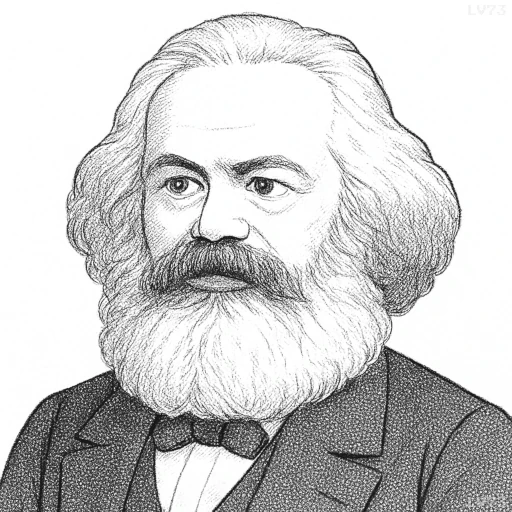“Religion is the sigh of the oppressed creature, the heart of a heartless world, and the soul of soulless conditions. It is the opium of the people.”

- May 5, 1818 – March 14, 1883
- Born in the Kingdom of Prussia (Germany)
- Philosopher, economist, political thinker
table of contents
Quote
“Religion is the sigh of the oppressed creature, the heart of a heartless world, and the soul of soulless conditions. It is the opium of the people.”
Explanation
In this famous quote, Marx critiques religion as a response to oppression and suffering under capitalist systems. He suggests that religion acts as a comfort or escape for the oppressed—it is the “sigh” of those who suffer, a temporary relief from their painful reality. By calling religion the “heart of a heartless world” and the “soul of soulless conditions,” Marx argues that religion provides a semblance of meaning and hope in a world that seems devoid of compassion and fairness. However, Marx goes on to describe religion as the “opium of the people,” a metaphor that suggests religion acts like a drug, numbing people to their suffering and distracting them from the real material causes of their oppression. Instead of addressing the economic and social injustices that lead to inequality, religion offers solace without changing the underlying structures of exploitation.
Historically, Marx viewed religion as a tool used by the ruling class to maintain control over the working class. By offering promises of an afterlife or divine justice, religion could pacify the oppressed, encouraging them to endure their current suffering without questioning the social system that created it. Religion, in this sense, became a way for the capitalist class to reinforce their power by offering the working class a false sense of hope. Rather than seeking to overthrow the capitalist system, the oppressed were encouraged to accept their suffering as part of a divine plan, thus preventing them from recognizing their potential for social or political action.
In modern times, Marx’s critique of religion continues to resonate in debates about ideology and social control. Religion, along with other forms of ideology, can sometimes be used to distract from the material realities of inequality and oppression. For example, in situations where poverty, racism, or economic exploitation are widespread, religious ideologies may be used to encourage people to endure these conditions for the promise of a better life after death, rather than challenging the social structures that cause their suffering. Marx’s quote remains a powerful reminder to critically examine how belief systems might be employed to maintain the status quo, rather than inspire the fundamental change needed to address societal injustices.
Would you like to share your impressions or related stories about this quote in the comments section?
